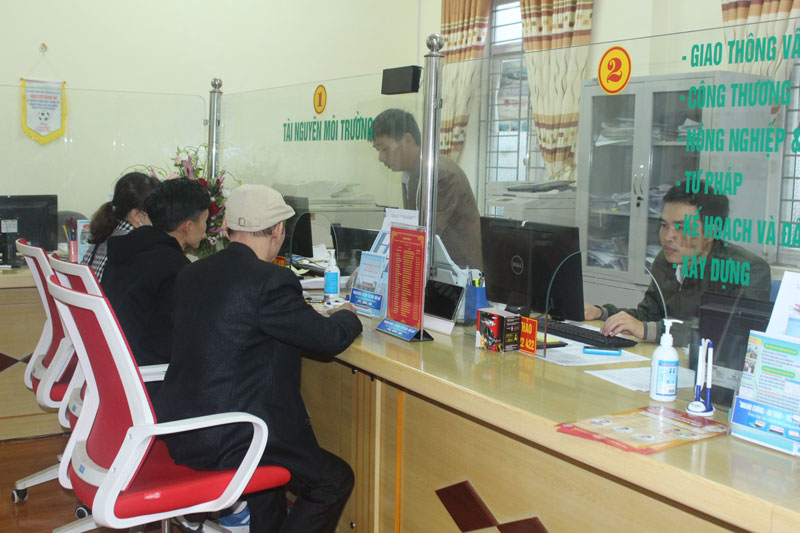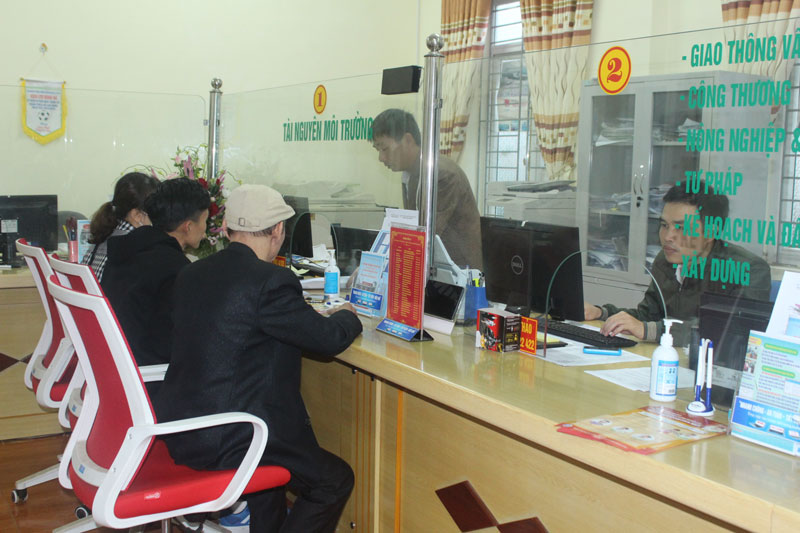
(HBO) – The provincial People’s Committee has annually issued plans for public administrative reforms and many important documents assigning specific related tasks to provincial departments and agencies as well as district-level administrations with the focus placed on promoting responsibility of all-level leaders in public administrative reforms, improving business climate and positively changing the working style of civil servants.

Single-window
unit of Lac Son district is equipped with modern devices to better serve citizens and organisations.
Since 2017,
Chairman of the provincial People’s Committee has approved simplification and
fee reduction of 183 administrative procedures, or 25.3 percent of the total, mostly
cutting time for processing a procedure, reducing the number of documents required to process a
civil services and requests for public notary, and eliminating unreasonable
requests and conditions that are costly and time-consuming.
Modern equipment
has been provided for the
provincial public administrative centre, all district-level and 34 percent of
commune-level single-window units. A total of 1,777 administrative procedures are delivered under single-window mechanism;
of which 1,426 are at provincial level, 246 atdistrict level and 105 at commune level.
The province also
provides 273 three-level and 648 four-level public services online. There are
almost no delay in handling public service inquiries.
At the same time,
the provincial Party Committee and People’s Committee have also taken drastic
measures to streamline the apparatus of administrative offices and
non-productive agencies at district, commune and village levels, thus cutting regular spending funded by the State budget./.
According to data from the Hoa Binh Provincial Party Committee, the industrial production index for the first six months of 2025 is estimated to have increased by 20% compared to the same period last year. This marks the highest year-on-year growth rate for this period since 2020.
In the first six months of 2025, Hoa Binh province’s export turnover was estimated at 1.145 billion USD, marking an 18.11% increase compared to the same period in 2024. Import turnover was estimated at $ 804 million, a 17.15% increase, which helped the province maintain a positive trade balance.
The lives of the ethnic minority farmers in Tan Lac district have gradually improved thanks to the new directions in agricultural production. This is a testament to the collective strength fostered through the professional associations and groups implemented by various levels of the district’s Farmers’ Union.
With the motto the "product quality comes first,” after nearly one year of establishment and operation, Muong village’s Clean Food Agricultural and Commercial Cooperative, located in Cau Hamlet, Hung Son Commune (Kim Boi district), has launched reputable, high-quality agricultural products to the market that are well-received by consumers. The products such as Muong village’s pork sausage, salt-cured chicken, and salt-cured pork hocks have gradually carved out a place in the market and they are on the path to obtaining the OCOP certification.
In the past, the phrase "bumper harvest, rock-bottom prices" was a familiar refrain for Vietnamese farmers engaged in fragmented, small-scale agriculture. But today, a new spirit is emerging across rural areas of Hoa Binh province - one of collaboration, organisation, and collective economic models that provide a stable foundation for production.
Maintaining growing area codes and packing facility codes in accordance with regulations is a mandatory requirement for agricultural products to be eligible for export. Recently, the Department of Agriculture and Environment of Hoa Binh province has intensified technical supervision of designated farming areas and packing facilities to safeguard the "green passport" that enables its products to access international markets.



